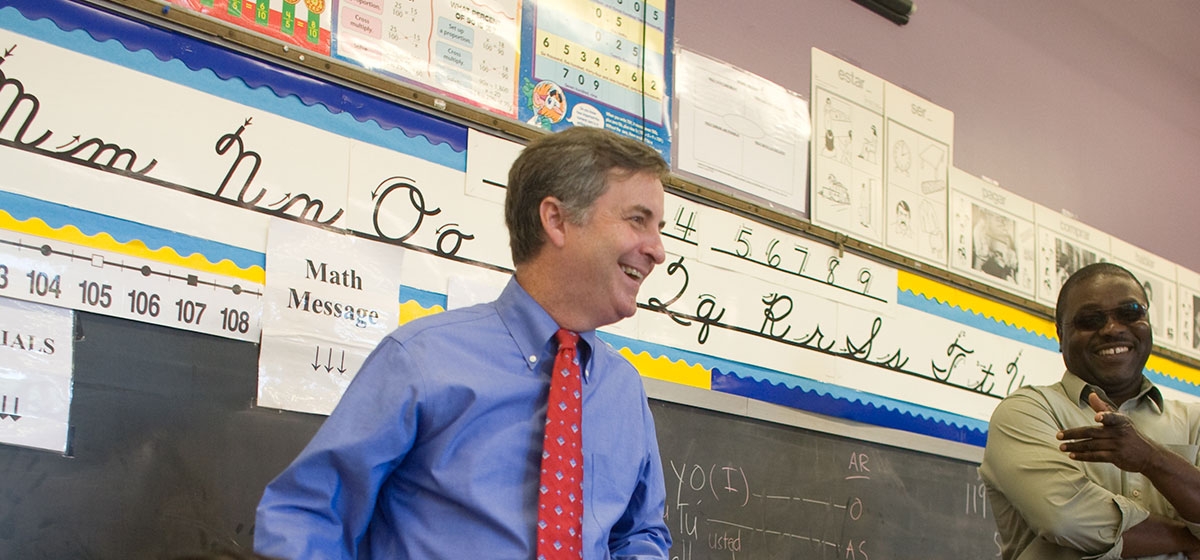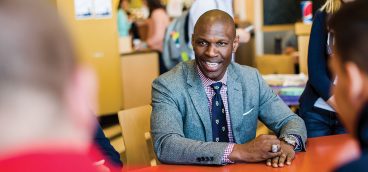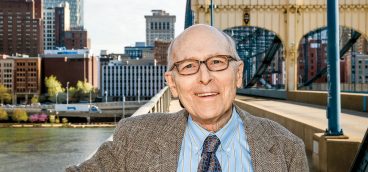Mark Roosevelt, Superintendent

My interest in educational reform started when I was in the legislature in Massachusetts. I was lucky enough, as a young legislator, to be offered the chairmanship of the Education Committee.
The Speaker of the House brought me in and said, “I want you to look at how Massachusetts funds and runs its public schools and come up with a comprehensive reform agenda for the state.” He knew that eventually I would have to do things that he and his supporters wouldn’t like. But to his credit, he assured me, “I’m going to support whatever you suggest. I want it to be my legacy.” That morphed into three years of intense work, which gave me a chance to focus on how public education is delivered and funded—and how it could be better. It was really an extraordinary gift.
I was born and raised in Washington, D.C., and certainly have a privileged background. My father was in government services but left when I was young and formed his own consulting company. I had a private education through high school and worked very hard; a fabulous education which probably influenced me more than anything else in my life. When I went on to Harvard, my earlier education had been so good that it made college relatively easy for me. So I’m quite aware of the advantages one gets from a rigorous education during formative years. And I believe that the kind of rigor you see in very good private schools is the kind of rigor you should see in very good public schools. The main difference is that private schools accept kids and expel kids. But the job of a public school is to educate everyone. So it’s far more challenging.
While in politics in Massachusetts, I was lucky enough to get education reform passed and made into law in 1993. But over time, I had grown disappointed with and even angry at the Republican incumbent governor, William Weld. I believed that I had achieved all I was ever going to be able to achieve in the legislature, so I figured, why not give a long-shot race a try? I won a difficult Democratic primary and then got swamped by Weld and the Republicans in the general election. In the aftermath, in essence, I woke up at 38 years old with everybody telling me, “It’s all right. You’ll be OK. Just start working for the next time.” But I didn’t want there to be a next time.
It took me a while to get on my feet again because, up to that point, politics had been my life. But in time, I realized that education was where I wanted to apply my energies. I had spent years in education policy-making in various roles and I continued that work through the 1990s and into the early years of the new century. But I wanted to see if I could make work on the ground what I had spent a lot of time thinking about. By then I was pretty sure that I wanted to be a large-city school superintendent, but I had never really worked within the system. How could I make myself an attractive candidate? At about the same time, almost unbelievably, I got a phone call from recruiters for a new superintendent training program, run by the Eli Broad Foundation. It was eerie, as if they were in my head. So I applied, was accepted, and, in 2003, graduated from the year-long training program. It wasn’t full-time. I was still working. But it’s a very individualized, extremely successful program. In fact, three of the four finalists for my current job here in Pittsburgh were graduates of the Broad program.
So I had spent a great deal of time—in various capacities—studying urban school districts, but when I landed in Pittsburgh I found that actually experiencing it was entirely different. I knew that there were budget problems, academic problems and management problems, but I had no idea that we were going to have to close 22 schools in my first year. Nothing could have prepared me for that. But the more I looked at the finances, the over-capacity and the enrollment trend-line, I realized we just couldn’t continue. At first we thought, let’s close six schools per year for four years. Then we thought, no way. That will sap all of our energy. Why not just do it, once and for all? So we did it, and the school board approved it, which was a very courageous thing to do. With that horror out of the way, we were able to move on to our academic reform agenda.
Now, the City of Pittsburgh and the Pittsburgh Public Schools have a lot of advantages. We have a significant number of dollars per pupil to spend, as we are one of the highest-spending urban districts in America. We have a lot of talent in our teachers and our principals. We do not have trouble recruiting teachers like a lot of urban systems do. We have a large number of teachers per student and, therefore, very small class sizes. We also have a manageable system—about 30,000 kids—and an active and generous foundation community plus a great deal of community, financial and social support. But we also have a lot of serious challenges. We have a declining population in the city and declining enrollment at its schools, which is a huge issue. Managing decline, in which you’re always closing things, is financially and psychologically brutal. If you’re not careful, people can end up in despair, feeling that everything’s slipping away and there’s not much one can do about it. People often stop trying. So what we had to do was to re-energize the system and get people to believe that it could do what it is supposed to do. To do that, we had to bring in people with vision and the skills to get it done. I think we’re more than halfway toward putting in place the pieces that, if allowed to work, will accomplish some pretty terrific things.
It’s pretty clear that Pittsburgh’s African-American population is economically disadvantaged. And it’s also clear that African-American kids are not getting educated to the same standards that their white compatriots are. So we launched eight new schools that we call Accelerated Learning Academies. They have a longer school day, a longer school year and some other core elements that we hope will improve things. When I came here three years ago, these kids were far behind. But the data is showing that they are now actually progressing faster than their compatriots in the system, which is great. But it’s a struggle, and it’s something that must be attended to constantly. In urban systems, especially in elementary schools, you often have kids of the same age functioning at very different levels. You may have a third grade literacy class in which some of the kids, whose home environments are very supportive, are reading at a sixth-grade level. It’s not uncommon at all. You may also have kids who are reading at a first-grade level. The challenge is, how do we meet both sets of needs? It’s why this work is so energizing. It’s a much more interesting challenge than is presented in more homogeneous environments.
It’s true that Pittsburgh doesn’t have the challenges of, say, Los Angeles or New York. We haven’t had a large immigration. Nevertheless, Pittsburgh is complicated, and mainly because of race. The African-American community is more isolated here than in many other cities. One thing we lack is a thriving African-American middle-class clamoring for educational improvement. I believe that is an important missing element here in Pittsburgh. How can we grow an African-American middle-class so that the next generations do better? That’s what our work is about.
It’s important for the region, for the city and for the future to educate these 30,000 city kids. No region ends up prospering if its central core is dysfunctional. Then, of course, there is the ethical imperative: These kids, for too long, have not really been given a fair chance to participate in American life as we know it. What I would like people to do is to recognize that we’re making very hard decisions. Closing 22 schools—Schenley High School last year makes 23—was a tough thing to do. And at the same time, I’d like people to look beyond that and see that we’re opening a science and technology focused sixth-through-12th-grade school in September 2009. We already have a performing arts high school that is one of the best in the country. We’re also opening a sixth-through-12th international baccalaureate program, which will be the first of its kind. This year, we opened a university preparatory school for kids who need accelerated learning. There we are partnered with the University of Pittsburgh, which just recruited a first-rate academician from Chicago to move here and occupy the Helen Faison Chair of Urban Education. He will be located in our school. Honestly, we could end up with a better educational product than our suburban competitors—and more options for hard-working kids. And of course, we have The Pittsburgh Promise, which is a gigantic gift from the Pittsburgh community to our kids. Guaranteed money for college. This will help them to dream big and work hard.
One of the reasons we lose kids in high school is because they face a deadening intellectual experience rather than an enlivening one. We are trying to create opportunities that actually change our students’ life prospects for the better. Students must feel cared for and must be afforded the chance to express their passions in an educational setting. We must do that for a whole lot of kids in many different settings. If we just continue to deepen our work, many exciting things will keep happening that will make people stop and say “Wow.”






